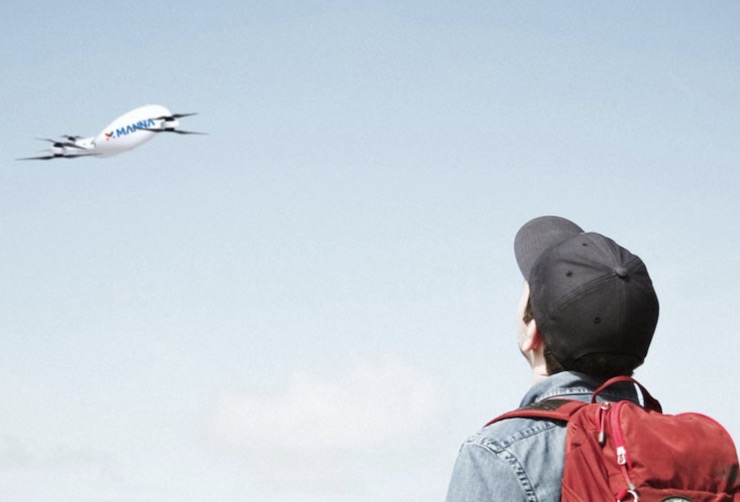
© Manna.aero
An Ireland-based company is about to join the US drone “club.” Manna Aero, which has already made tens of thousands of package deliveries in the suburbs surrounding Dublin, is planning on repeating its performance on a smaller scale in Texas. The company still needs formal regulatory approval from the Federal Aviation Administration, but given its sterling safety track record back home, Manna’s drones, which can carry up to 7.5 kgs of cargo at speeds of up to 60 mph, will likely be flying and making deliveries by the end of the summer, officials say.
And Manna’s not flying solo. It’s already secured a major partnership with Coca-Cola-HBC, the parent company’s bottling distributor, which could eventually lead to worldwide delivery operations. In Texas, Manna’s being backed by a prominent real estate company, Hillwood, which sells and manages properties in a 27,000 acre residential area just outside Dallas-Fort Worth.
“We’ll begin with a single hub with less than 10 drones and grow our footprint as necessary,” said Manna Chief Executive Bobby Healy last month. “This will be a smaller, less advanced version of our European operation, but we will show that our technology, vehicles and operations are safe and fundamentally compatible with US regulations.”
Manna isn’t the only drone company looking to Texas as a launching pad. Google’s Alphabet subsidiary Wing already makes drone deliveries in two small towns, Little Elm and Frisco, and Flytrex, an Israeli concern, operates nearby in Granbury. Meanwhile Amazon’s Prime Air Service is still struggling to get its drone deliveries in College Station, farther to the south, off the ground.
Manna, with full FAA approval, may well surpass its Texas competitors. Ireland is densely populated, relative to rural areas in America, and many of Manna’s past flights were in towns of 35,000 people or more. That means Manna has already proven that it can fly low over concentrated areas without producing undue noise or injury, a claim few drone companies can make. With such a sterling track record, it’s possible that Manna could receive advanced BVLOS authority to conduct autonomous long-distance flights unimpeded, even before its US competitors do.
And Manna may have another important edge: The company just received a whopping $40 million infusion of investment capital – reportedly from Coca-Cola. With other European backers standing by, the company’s poised to set up a plant, hire staff and build out its drone infrastructure more quickly
For its part, Coca Cola HB is touting its partnership with Manna as a means of reaching its goal of net zero carbon emissions by the year 2040. “Our investment in Manna encapsulates our ambition to deliver our products in new and more sustainable ways. We are excited about this partnership which allows us to be at the forefront of disruptive technologies across the worldwide consumer packaged goods market,” says company CEO Zoran Bogdanovic.
Enhancing sustainability is also a key selling point for Manna. In one video recounting 500 drone deliveries at Manna’s first location in Balbriggan, Ireland, the company boasted that its battery powered drones were carbon-free but estimated that delivering the same packages by car would have emitted 321 kg. of carbon dioxide. While some emissions do occur during battery recharging at public power grid stations, Manna estimates that overall emissions from its drone service are eight times less than would result from road delivery over the same distance.
|